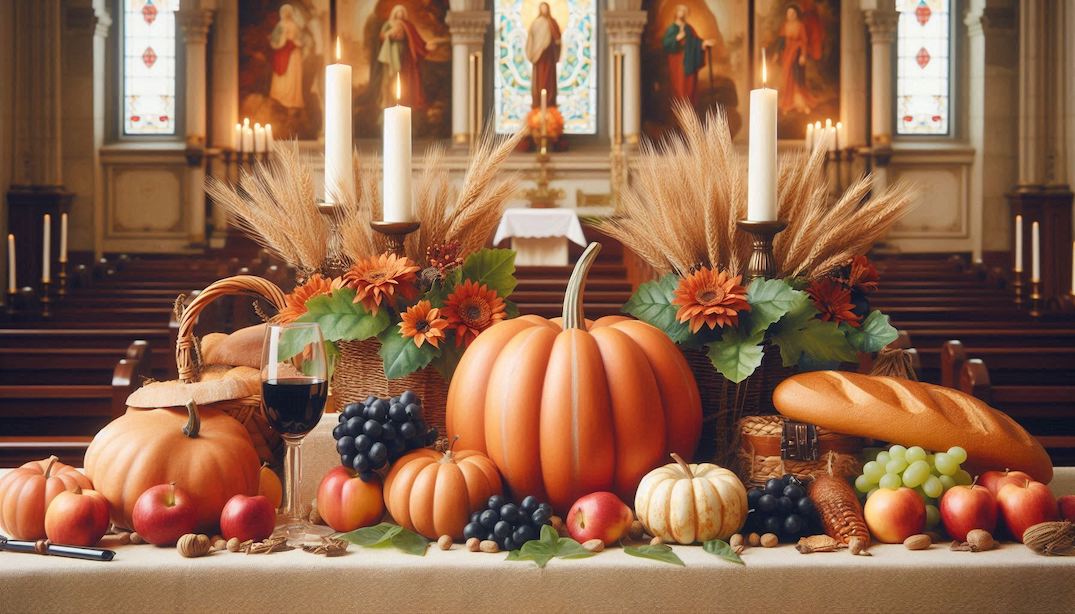
“Come, let us sing joyfully to the LORD; cry out to the rock of our salvation.” (Psalm 95:1) This verse reminds us of November 28, the day America—and perhaps the world—celebrates Thanksgiving. It is both a spiritual and a social occasion.
For Americans, Thanksgiving Day holds extraordinary significance. It’s a time to reflect on life, appreciate what they have, and thank God for His blessings. As Catholics, Thanksgiving is also an opportunity to thank God for the gift of life, the privilege of being human, and for peace and abundance. While the idea of giving thanks is universal across cultures and has existed for centuries, it only became a significant holiday in the United States in the 19th century. Abraham Lincoln was the first U.S. president to declare Thanksgiving a national holiday. By 1941, under President Franklin D. Roosevelt, Thanksgiving was officially set as the fourth Thursday of November each year.
The spirit and true meaning of Thanksgiving, as understood by Native Americans—both traditionally and today—emphasizes gratitude for creation, divine providence, and the interconnectedness of people with nature and each other. It is rooted in the philosophy of giving without expecting anything in return.
In the Bible, gratitude represents a fundamental characteristic of God’s people. Both the Old and New Testaments highlight thankfulness and praise to God for His countless blessings.
Why Does God Desire Gratitude?
God the Father seeks our gratitude for His providence and creation. God the Son desires our thanks for bearing and atoning for humanity’s sins. God the Holy Spirit invites us to give thanks for His sanctification and comfort. God, in His divine nature, feels joy when we are grateful.
Jesus teaches us about gratitude, emphasizing unconditional love and mercy expressed through kindness and generosity. Thanksgiving itself is nothing more than recognizing blessings and sharing those blessings with others.
I will glory in the LORD; let the afflicted hear and rejoice.
Glorify the LORD with me; let us exalt his name together.
I sought the LORD, and he answered me;
he delivered me from all my fears
(Psalm 34:2-4)
God longs to hear our thanksgiving. King David spoke of thanksgiving as “his praise will always be on my lips” The Native Americans and the first settlers in America celebrated a day of thanksgiving to God. And what about us? Do we recognize the need to thank Him? Thank Him for everything He has allowed in our lives?
Around us, we see criminals living carefree while kind-hearted people endure countless struggles. Does God in heaven see this injustice? Or is He aware but powerless to intervene? These are the temptations that lead people to deny God’s love and blessings, cursing Him for the suffering they perceive in their lives.
Like Peter, in moments of confusion and doubt, we must boldly affirm our faith in Jesus: “Lord, to whom shall we go? You have the words of eternal life.” (John 6:68) These words open a new perspective on our world and on our lives, even amidst what Pope Saint John Paul II referred to as “the mystery of suffering.” However, the ultimate answers to the mysteries of suffering, injustice, and trials can only be found, as Saint Thérèse of Lisieux said, “in heaven.”
In heaven, where human understanding is illuminated by eternal light and truth, we will finally understand the reasons for our suffering and that of others. We will realize why we should even thank God for the trials we faced and for the people who caused us pain. When the “mystery of suffering” is revealed, we will understand that our struggles arose from a lack of effort, patience, or misguided attempts. We will also see that some hardships were reminders or opportunities for growth, placed by God’s loving hand to prevent us from falling into greater temptations or sins that could cost us eternal life.
While we await the revelation of the Mystery of Suffering, let us trust in and live by the truths that David believed and practiced when he faced evil, insults, and mockery:
The LORD’s face is against evildoers
to wipe out their memory from the earth.
The righteous cry out, the LORD hears
and he rescues them from all their afflictions.
The LORD is close to the brokenhearted,
saves those whose spirit is crushed.
Many are the troubles of the righteous,
but the LORD delivers him from them all.
He watches over all his bones;
not one of them shall be broken. (Psalm 34:17-21)
In conclusion, thanking God is not only an act of gratitude but also an opportunity to receive even greater blessings. Thanksgiving is not limited to one day; as David said, “His praise will always be on my lips.” (Psalm 34:2)
Lord, I thank You for the countless reasons to be grateful each time I reflect on my life. Please help me use this moment to offer thanks for the blessings I have received. May my gratitude become a way of life—toward You, myself, others, and the world. Amen.
– Trần Mỹ Duyệt, Ph.D. in Psychology –
